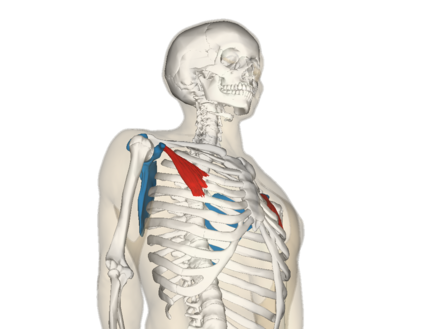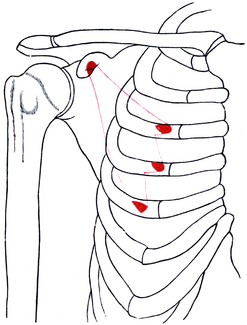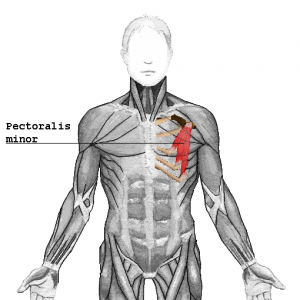Pectoralis Minor: Difference between revisions
No edit summary |
No edit summary |
||
| Line 17: | Line 17: | ||
== Anatomy == | == Anatomy == | ||
[[File:Pec minor.png|right|frameless]] | [[File:Pec minor.png|right|frameless|alt=|325x325px]] | ||
=== Origin === | === Origin === | ||
| Line 41: | Line 41: | ||
== Clinical Relevance == | == Clinical Relevance == | ||
[[File:Pectoralis minor.png|alt=|right|frameless]] | Many issues that can present as a result of pectoralis muscle dysfunctions, most commonly are due prolonged slouched positions. This can result in pain and/or restriction in neck movements and stiffness and pain in the upper back. It can increase the likelihood of rotator cuff pathologies and impingement, as well as restricting shoulder range of movement. It can even result it in neuropathic pain in the arm. These are but a few of the things we would see on a daily basis that pec dysfunctions contribute towards.<ref>Get active physio [https://getactivephysio.com.au/pec-minor-and-its-major-impacts/ Pec minor and its major impact] Available: https://getactivephysio.com.au/pec-minor-and-its-major-impacts/ (accessed 8,1,2022)</ref>[[File:Pectoralis minor.png|alt=|right|frameless]] | ||
=== Weakness === | === Weakness === | ||
Revision as of 02:02, 8 January 2022
Original Editor - Esraa Mohamed Abdullzaher
Top Contributors - Ilona Malkauskaite, Lucinda hampton, Esraa Mohamed Abdullzaher, Joao Costa, Ahmed Nasr and Kim Jackson
Description[edit | edit source]
The pectoralis minor is triangular in shape and is located under the pectoralis major, and both form the anterior wall of the axilla.
It originates from the margins of the third to fifth ribs adjacent to the costochondral junction. The fibers consequently pass upward and laterally to insert into the medial border and superior surface of the coracoid process.
It is crucial in the stabilization of the scapula by pulling it downward and anteriorly against the thoracic wall.[1]
The pectoralis minor muscle creates a passage between the ribs for the transit of the brachial plexus and both the subclavian artery and vein. If the muscle is shortened/tight this abnormal tension negatively affects the position of the scapula (upwards) and the movement of the shoulder and can also cause thoracic outlet syndrome[1].[2][3]
Image 1: Pectoralis minor muscle (red) and shoulder blade (blue).
Anatomy[edit | edit source]
Origin[edit | edit source]
The base of pectoralis minor is formed by fleshy slips arising from the anterior third to fifth ribs, close to the costal cartilage. Variations in the origin of the muscle is common.[2][3]
Insertion[edit | edit source]
The apex of the triangle inserts into the medial border and upper surface of coracoid process of the scapula.[2][3]
Image: Pectoralis minor of right side : outline and attachment-areas.
Nerve Supply[edit | edit source]
Its main nerve supply is from the medial pectoral nerves ( C8 _ T1 ), It may also be innervated by the lateral pectoral nerve via a communicating branch known as 'ansa pectoralis',[2]
Artery Supply[edit | edit source]
The blood vessel that supplies the pectoralis minor muscle is the thoracoacromial artery; a short artery that branches off from the larger axillary artery of the chest and upper extremities.[4]
Function[edit | edit source]
- The primary actions of this muscle include the stabilization, depression, abduction or protraction, internal rotation and downward rotation of the scapula.
- It elevates the ribs for deep inspiration when the pectoral girdle is fixed or elevated.
- With the scapula stabilized, in a position of good alignment, the pectoralis minor acts as an accessory muscle of inspiration. [5]
- When the ribs are immobilized, this muscle brings the scapula forward,
- Both pectoralis muscles work with the serratus anterior muscles to create full range of movement for the scapula.[6]
Clinical Relevance[edit | edit source]
Many issues that can present as a result of pectoralis muscle dysfunctions, most commonly are due prolonged slouched positions. This can result in pain and/or restriction in neck movements and stiffness and pain in the upper back. It can increase the likelihood of rotator cuff pathologies and impingement, as well as restricting shoulder range of movement. It can even result it in neuropathic pain in the arm. These are but a few of the things we would see on a daily basis that pec dysfunctions contribute towards.[7]
Weakness[edit | edit source]
When pectoralis minor is weak, the strength of arm is diminished. Moreover, weakness of this muscle will increase respiratory difficulty in patients already experience fatigue and/or compromise of the respiratory muscles. [5]
Shortnening[edit | edit source]
- Pectoralis minor is a tonic muscle that tends to be overactive and prone to tightness.[8]
- In Neurokinetic therapy (NKT), pectoralis minor is considered the king of compensation, as it tends to be overactive for an inhibited or under active Serratus anterior. There are many factors that cause it to become shortened and tight, including rounded shoulder posture, glenohumeral joint dysfunction,breathing dysfunction, and other compensatory factors.[9]
- An overactive pectoralis minor and underactive serratus anterior leads to winging of the scapula - prominence of the medial border of the scapula with anterior tilting, together with prominence of the inferior angle and depression of the coracoid process. This muscle shortening is an important contributing factor in many cases of arm pain.
- With the cords of brachial plexus and the axillary blood vessels lying between the coracoid process and the rib cage, shortening of pectoralis minor may produce impingement on these large vessels and nerves, causing shoulder impingement and thoracic outlet syndrome.
- A shortened pectoralis minor restricts flexion of the shoulder joint by limiting scapular rotation and preventing glenoid cavity from attaining the cranial orientation necessary for complete flexion of the joint. [5]
N.B if you want to activate serratus anterior and minimize the work or activity of Pectoralis minor you have to do exercises that has highly selective activation for serratus anterior not pectoralis minor the most effective exercises are :[10]
- Serratus Punch Exercise : it is highly selective to serratus anterior.
- The Modified Push-Up Plus Exercise: both on the floor and and against the wall version, with emphasis on the concentric phase of the exercise.
Trigger points[edit | edit source]
Trigger points in pectoralis minor have almost identical referred pain patterns as in pectoralis major muscle.These pain patterns start in the front of shoulder and can extend down the inside of the arm, elbow, forearm, palm of the hand, and into the pinky, ring, and middle fingers. A tense pectoralis minor muscle can also entrap nerves in the armpit region causing pain, numbness, and tingling down the arm and into the hand.[11]
Assessment[edit | edit source]
Palpation[edit | edit source]
Power[edit | edit source]
Position: Supine. Fixation is not necessary by the examiner unless abdominal muscles are weak, in which case the rib cage on the same side should be held down firmly.
Test: Forward thrust of the shoulder, with the arm at the side. Pressure: Against the anterior aspect of the shoulder, downward toward the table. [5]
Length[edit | edit source]
Position: Patient is supine with the arms at the sides, elbows extended, palms upward, knees bent and lower back flat on the table.
Test: The examiner stands at the head of the table and observes the position of the shoulder girdle. The amount of tightness is measured by the extent to which the shoulder is raised from the table and by the amount of resistance to downward pressure on the shoulder. Tightness may be recorded as slight, moderate, or marked.
Treatment[edit | edit source]
Strengthening[edit | edit source]
Stretching[edit | edit source]
Manual Therapy[edit | edit source]
See also[edit | edit source]
References[edit | edit source]
- ↑ 1.0 1.1 Baig MA, Bordoni B. Anatomy, Shoulder and Upper Limb, Pectoral Muscles.Available:https://www.ncbi.nlm.nih.gov/books/NBK545241/ (accessed 8.1.2021)
- ↑ 2.0 2.1 2.2 2.3 kenhub.Pectoralis minor muscle. Available from:https://www.kenhub.com/en/library/anatomy/pectoralis-minor-muscle (accessed 20 July 2018).
- ↑ 3.0 3.1 3.2 Keith L. , Anne M. R . Clinically Oriented Anatomy seventh edition . philidephia : Lippincott Williams & Wilkins.Feb 13, 2013
- ↑ Study.com. Pectoralis Minor: Function, Blood Supply & Innervation. Available from:https://study.com/academy/lesson/pectoralis-minor-function-blood-supply-innervation.html (accessed 20 July 2018).
- ↑ 5.0 5.1 5.2 5.3 Kendall F, McCreary E, Provance P,Rodgers M,Romani W. Muscles:Testing and function with posture and pain. 5th ed. Philadelphia: Lippincott Williams & Wilkins, 2005.
- ↑ health line. Pectoralis minor. Available from: https://www.healthline.com/human-body-maps/pectoralis-minor#1 \(accessed 20 July).
- ↑ Get active physio Pec minor and its major impact Available: https://getactivephysio.com.au/pec-minor-and-its-major-impacts/ (accessed 8,1,2022)
- ↑ Page .P, Frank C, Lardner R. Assessment and Treatment of Muscle Imbalance: The Janda Approach .Champaign . Human Kinetics. 2010.
- ↑ Neurokinetic Therapy® The Missing Link.The Pectoralis Minor, King of Compensation. Available from:https://neurokinetictherapy.com/the-pectoralis-minor-king-of-compensation?fbclid=IwAR34776TwROAI2UYWziqwf0EO2kF4tngWEGqiSaF81AHBRpv_AYlb5u6LDI (accessed 12/4/2019)
- ↑ Castelein, B., Cagnie, B., Parlevliet, T., Cools, A. Serratus anterior or pectoralis minor: Which muscle has the upper hand during protraction exercises?. Manual Therapy,April 2016: 22, 158–164.
- ↑ trigger point therapist. Pectoralis minor. Available from:http://www.triggerpointtherapist.com/?s=pectoralis+minor (accessed 19 July 2018).









